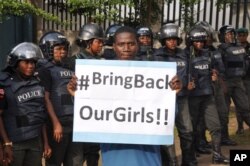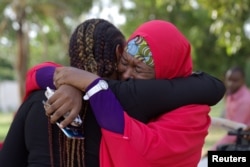It has been two days since the jihadist sect Boko Haram released a video that showed as many as 50 of the missing Chibok schoolgirls still alive, and the Nigerian government has yet to reach out to the family of the girl who was singled out in the video.
The lack of contact has again left the families of the Chibok girls feeling neglected.
"No one from the Nigerian government has contacted us. Maybe it's because we are poor or because we don't have oil in Chibok. We are nobody. But I am glad to know that God has answered my prayers by keeping her alive," said Esther Yakubu, whose daughter appeared in the video. "The message I have for the federal government is to release the [jailed] fighters so that the [other] fighters will release the girls.”
In the latest Boko Haram video, Yakubu's daughter Dorcas Maida Yakubu spoke in her native language.
"We are suffering here. There is no kind of suffering we haven't seen," Dorcas Maida Yakubu says in the recording. "Tell the government to give them [Boko Haram] their people so we can also come home to be with you. ... There is nothing you, or we, can do about this, but to get their people back to them, so we can go home."
Dorcas Maida Yakubu also says many of her fellow abductees have been injured and hurt. Some have been killed by Nigerian airstrikes, which the Nigerian military said was unlikely.
The captive was 15 years old when Boko Haram abducted her and nearly 300 of her classmates from their school in the town of Chibok in northeastern Nigeria in April 2014.
Possibility of negotiations
Boko Haram's latest video has sparked a fierce debate within Nigeria about the possibility of negotiations between the federal government and the jihadist sect. Last year, Nigerian President Muhammadu Buhari said he was open to talking to a credible Boko Haram leader.
That is a struggle for the group.
Ever since the 2009 extrajudicial killing of its founder, Mohammed Yusuf, the sect has been fractured, with splinter groups emerging and disappearing from the public eye.
Earlier this month, a leadership crisis erupted when the Islamic State announced Mohammed Yusuf's spiritual son, Abu Musab al-Barnawi, as the "governor" of the Islamic State's West Africa Province (ISWAP), otherwise known as Boko Haram.
The announcement implied that Abubakar Shekau, who has led the group since the death of the founder, had been replaced.
The group is now split into factions, with both al-Barnawi and Shekau vying for supremacy and denouncing one another in recent audio broadcasts.
The Nigerian federal government said it has reached out to the group. But the divisions threaten possible negotiations.
Failed talks
In the past, talks with the sect have fallen through over lack of credible liaisons. The Nigerian government said it is being cautious.
But some say that the latest video is a publicity stunt by Shekau, who appears desperate. An ongoing military offensive by troops from Nigeria, Niger, Chad and Cameroon has forced Boko Haram to flee from many areas it once controlled.
Muslims Rights Concern, a Nigeria group that protects the rights of Muslims, says, "Boko Haram released the video because its logistics are in shambles. It is surrounded on all sides. Its supplies are cut off. The game is up. Boko Haram should surrender instead of trying to hoodwink Nigerians."
Counterterrorism policy analyst Yan St-Pierre says Shekau's message is intended to go beyond his own followers and his rival, al-Barnawi. It may be aimed directly at the central power, the Islamic State.
"It's actually speaking to [IS leader Abu Bakr] al-Baghdadi and anyone else who is in the high rank of ISIS officials to show them, ‘Look, choosing Abu Musab al-Barnawi is a mistake. I'm actually the one in the charge. I'm the one that provided results for this organization. I'm the one who still has control. I'm the one who is still pulling the strings,' " said St-Pierre, using another acronym for the militant group.
The Bring Back Our Girls group, which has spearheaded the campaign to pressure the Nigerian government to find and rescue the missing Chibok girls, says it is not opposed to negotiations. The members plan to march to the presidential office in the next few days to re-engage with Buhari.
Repeated requests
Boko Haram has repeatedly used the Chibok girls as a bargaining chip, demanding the federal government release detained Boko Haram members in exchange for the girls. But there are also hundreds of other, lesser-known hostages being held by the group.
"Will they also be used as bargaining chips?" St-Pierre asked. "By negotiating with Boko Haram, by giving into its demands, it would most likely set a precedent that would not end up well.
"At this point in time, especially if you look at the larger picture, it's not to the advantage of the Nigerian government to free the girls via negotiations, especially if you consider all that PR [public relations] rhetoric about being on their way to defeating Boko Haram, and Boko Haram being kicked out. It would be acknowledging the fact that they are unable to complete the job," he added.
Boko Haram has killed at least 20,000 people in its seven-year uprising against the Nigerian government. It surpassed IS in 2014 to become the world's deadliest terrorist group, according to the 2015 Global Terrorism Index, published by the Institute for Economics and Peace.
Esther Yakubu knows how dangerous the group is, but she says negotiating with them is a high price that must be paid as soon as possible. After the mass abduction, she fled her home in Chibok. More than 2 million people have been displaced because of Boko Haram attacks.
Her family now rents a two-bedroom home in Abuja, where every night the family gathers to pray for Dorcas Maida to return.
"I just want my sister back," says 15-year-old Happy.
Esther Yakubu ends the night the way she often does, opening her Bible and looking at the photos left between the pages — two pictures of her smiling daughter captured just days before she was kidnapped.
Staring at the photo, tears gather in her eyes and fall down her cheeks.
"We are with you in spirit, even though you are not physically here with us," she says.









